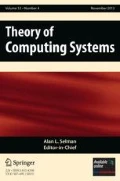Abstract
Stable and balanced outcomes of network bargaining games have been investigated recently, but the existence of such outcomes requires that the linear program relaxation of a certain maximum matching problem have integral optimal solution. We propose an alternative model for network bargaining games in which each edge acts as a player, who proposes how to split the weight of the edge among the two incident nodes. Based on the proposals made by all edges, a selection process will return a set of accepted proposals, subject to node capacities. An edge receives a commission if its proposal is accepted. The social welfare can be measured by the weight of the matching returned. The node users exhibit two characteristics of human nature: greed and idealism. We define these notions formally and show that the distributed protocol by Kanoria et al. can be modified to be run by the edge players such that the configuration of proposals will converge to a pure Nash Equilibrium, without the integrality gap assumption. Moreover, after the nodes have made their greedy and idealistic choices, the remaining ambiguous choices can be resolved in a way such that there exists a Nash Equilibrium that will not hurt the social welfare too much.


Similar content being viewed by others
Notes
In case x + y < wij the remaining amount is lost and not gained by anyone.
The actual gain of an agent could be scaled according to the weight we, but this will not affect the Nash Equilibrium.
As a side note, we remark that our results implies that under the unique integral LP optimum assumption, there will be no ambiguous edges left.
References
Azar, Y., Birnbaum, B., Elisa Celis, L., Devanur, N.R., Peres, Y.: Convergence of local dynamics to balanced outcomes in exchange networks. FOCS 2009, pp. 293–302 (2009)
Azar, Y., Devanur, N.R., Jain, K., Rabani, Y.: Monotonicity in bargaining networks. SODA 2010, pp. 817–826 (2010)
Baillon, J., Bruck, R.E.: The rate of asymptotic regularity is O\((1/\sqrt {n})\). Theory and applications of nonlinear operators of accretive and monotone type, Lecture Notes in Pure and Appl Math, pp. 51–81 (1996)
Bateni, M.H., Hajiaghayi, M.T., Immorlica, N., Mahini, H.: The cooperative game theory foundations of network bargaining games. ICALP 2010, pp. 67–78 (2010)
Bayati, M., Borgs, C., Chayes, J., Zecchina, R.: Belief-propagation for weighted b-matchings on arbitrary graphs and its relation to linear programs with integer solutions. SIAM J. Discrete Math. 25, 989 (2011)
Bayati, M., Borgs, C., Chayes, J.T., Kanoria, Yash, Montanari, A.: Bargaining dynamics in exchange networks. J. Econ. Theory 156, 417–454 (2015)
Bayati, M., Shah, D., Sharma, M.: Max-product for maximum weight matching Convergence, correctness, and lp duality. IEEE Trans. Inf. Theory 54(3), 1241–1251 (2008)
Binmore, K.: Game Theory and the Social Contract, vol. 2, MIT Press (1998)
Elisa Celis, L., Devanur, N.R., Peres, Y.: Local dynamics in bargaining networks via random-turn games. WINE 2010, pp. 133–144 (2010)
Chakraborty, T., Kearns, M.: Bargaining solutions in a social network. WINE 2008, pp. 548–555 (2008)
Chakraborty, T., Kearns, M., Khanna, S.: Network bargaining: algorithms and structural results. EC 2009, pp. 159–168 (2009)
Cook, K.S., Yamagishi, T.: Power in exchange networks A power-dependence formulation. Soc. Networks 14, 245–265 (1992)
Driessen T.S.H.: Cooperative Games: Solutions and Applications. Kluwer Academic Publishers (1988)
Ishikawa, S.: Fixed points and iteration of a nonexpansive mapping in a banach space. Proceedings of the American Mathematical Society 59(1), 65–71 (1976)
Kanoria, Y.: An fptas for bargaining networks with unequal bargaining powers. WINE 2010, pp. 282–293 (2010)
Kanoria, Y., Bayati, M., Borgs, C., Chayes, J.T., Montanari, A.: Fast convergence of natural bargaining dynamics in exchange networks. SODA 2011 (2011)
Kleinberg, J., Tardos, É.: Balanced outcomes in social exchange networks. STOC’ 08, pp. 295–304
Koufogiannakis, C., Young, N.E.: Distributed fractional packing and maximum weighted b-matching via tail-recursive duality. DISC’09 (2009)
Lotker, Z., Patt-Shamir, B., Pettie, S.: Improved distributed approximate matching. SPAA 2008, pp. 129–136 (2008)
Nash, J.: The bargaining problem. Econometrica 18, 155–162 (1950)
Nieberg, T.: Local, distributed weighted matching on general and wireless topologies. In: Proceedings of the Fifth International Workshop on Foundations of Mobile Computing, DIALM-POMC ’08 , pp 87–92. ACM, New York (2008)
Sanghavi, S., Malioutov, D.M., Willsky, A.S.: Linear programming analysis of loopy belief propagation for weighted matching. NIPS’ 07 (2007)
Schrijver, A.: Combinatorial optimization: polyhedra and efficiency, vol. 24, Springer Science & Business Media (2003)
Author information
Authors and Affiliations
Corresponding author
Additional information
Publisher’s Note
Springer Nature remains neutral with regard to jurisdictional claims in published maps and institutional affiliations.
The conference version of the paper has appeared in the European Symposium on Algorithms 2012. This research was partially funded by Hong Kong RGC under the contract 17202715.
This work was done while the author was at the University of Hong Kong.
Rights and permissions
About this article
Cite this article
Chan, TH.H., Chen, F. & Ning, L. Optimizing Social Welfare for Network Bargaining Games in the Face of Instability, Greed and Idealism. Theory Comput Syst 64, 999–1027 (2020). https://doi.org/10.1007/s00224-019-09958-4
Published:
Issue Date:
DOI: https://doi.org/10.1007/s00224-019-09958-4




